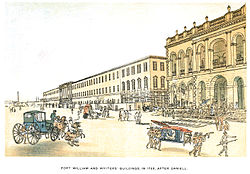The Supreme Court of Judicature at Fort William in Calcutta, was founded in 1774 by the Regulating Act of 1773. It replaced the Mayor's Court of Calcutta and was British India's highest court from 1774 until 1862, when the High Court of Calcutta was established by the Indian High Courts Act 1861.
| Supreme Court of Judicature at Fort William | |
|---|---|
 Supreme Court of Judicature at Fort William, c. 1786 | |
| Established | October 22, 1774 |
| Dissolved | 1862 |
| Location | Calcutta, Bengal, British India |
| Authorized by | Regulating Act of 1773 |
| Appeals to | Privy Council of the United Kingdom |
| Judge term length | Life tenure |
| Number of positions | 4 by statute |
From 1774 to the arrival of Parliament's Bengal Judicature Act of 1781 in June 1782, the Court claimed jurisdiction over any person residing in Bengal, Bihar or Orissa. These first years were known for their conflict with the Supreme Council of Bengal over the Court's jurisdiction. The conflict came to an end with Parliament's passing of the Bengal Judicature Act of 1781 which restricted the Supreme Court's jurisdiction to either those who lived in Calcutta, or to any British subject in Bengal, Bihar and Orissa, thereby removing the Court's jurisdiction over any person residing in Bengal, Bihar and Orissa.
The courthouse itself was a two storied building with Ionic columns and an urn-topped balustrade and stood by the side of the Writers’ Buildings. The building also served as the Town Hall of Calcutta at one time. It was demolished in 1792 and replaced by the present building in 1832.
- The Court's first judges were
- Sir Elijah Impey, Chief justice from 1774 to 1783 on his recall to England for impeachment.
- Stephen Caesar Le Maistre, Puisne judge from 1774 to 1777 on his death.
- John Hyde (judge), Puisne judge from 1774 to 1796 on his death.
- Robert Chambers, Puisne judge from 1774 to 1783, Acting Chief Justice from 1783 to 1791. Chief Justice from 1791-1798, on his resignation.[1]
- Sir William Jones, Puisne judge from 1783 to 1794 on his death.
- Sir William Dunkin, Puisne judge from August 14, 1791 to unknown.
Chief Justices edit
| Chief Justice | Term | Notes |
|---|---|---|
| Sir Elijah Impey[2] | 16 March 1774–1791 | Recalled 1783 |
| Sir Robert Chambers[2] | 1791–1 Aug 1798 | previously Acting Chief Justice 1783–1791 |
| Sir John Anstruther, Bt[2] | 1798–22 Feb 1806 | |
| Sir Henry Russell[2] | 1807–9 Nov 1813 | |
| Sir Edward Hyde East[2] | 1813–July 1822 | |
| Sir Robert Henry Blosset[2] | 1822–1 Feb 1823 | (died in office) |
| Sir Christopher Puller[2] | 1823–26 May 1824 | (died in office) |
| Sir Charles Grey[2] | 1825–1832 | |
| Sir William O. Russell | 22 Feb 1832–1833 | (died in office) |
| Sir Edward Ryan | 1833–1842 | |
| Sir Lawrence Peel | 1842–1855 | |
| Sir James William Colvile | 1855–1859 | |
| Sir Barnes Peacock | 1859–1862 | afterwards Chief Justice of the High Court of Calcutta |
- for Chief Justices after 1862 see High Court of Calcutta
Puisne Justices edit
| Puisne Justices | Term | Notes |
|---|---|---|
| Stephen Caesar Le Maistre | 22 October 1774–4 Nov 1777 | Died |
| John Hyde[2] | 22 October 1774–8 July 1796 | Died |
| William Jones[2] | 22 Oct 1783–27 Apr 1791 | Died |
| William Dunkin[2] | 3 Sept 1791–1 Aug 1797 | Resigned |
| James Watson[2] | 1 Mar 1796–2 May 1796 | Died |
| John Royds[2] | 23 Oct 1797–26 Sept 1816 | Died |
| William Burroughs[2] | 3 Nov 1806–20 Dec 1815 | Resigned |
| Francis Maonaghten[2] | 1 Mar 1816–2 Mar 1825 | Resigned |
| Anthony Buller | 26 Sept 1816–1 Jan 1827 | Resigned |
| John Franks | 6 Oct 1825–15 Mar 1831 | Resigned |
| John Peter Grant[3] | 17 Oct 1833–1848 | |
| Benjamin Heath Malkin | 6 Oct 1835–21 Oct 1837 | Died |
References edit
- ^ Curley, Thomas M. (1998). Sir Robert Chambers: Law, Literature, and Empire in the Age of Johnson. University of Wisconsin Press. ISBN 0299151506.
- ^ a b c d e f g h i j k l m n o Auber, Peter. An Analysis of the Constitution of the East-India Company. p. 758.
- ^ Stearn, Roger T. (2004). "Grant, Sir John Peter, of Rothiemurchus (1774–1848), politician and judge". Oxford Dictionary of National Biography (online ed.). Oxford University Press. doi:10.1093/ref:odnb/11273. Retrieved 3 February 2021. (Subscription or UK public library membership required.)